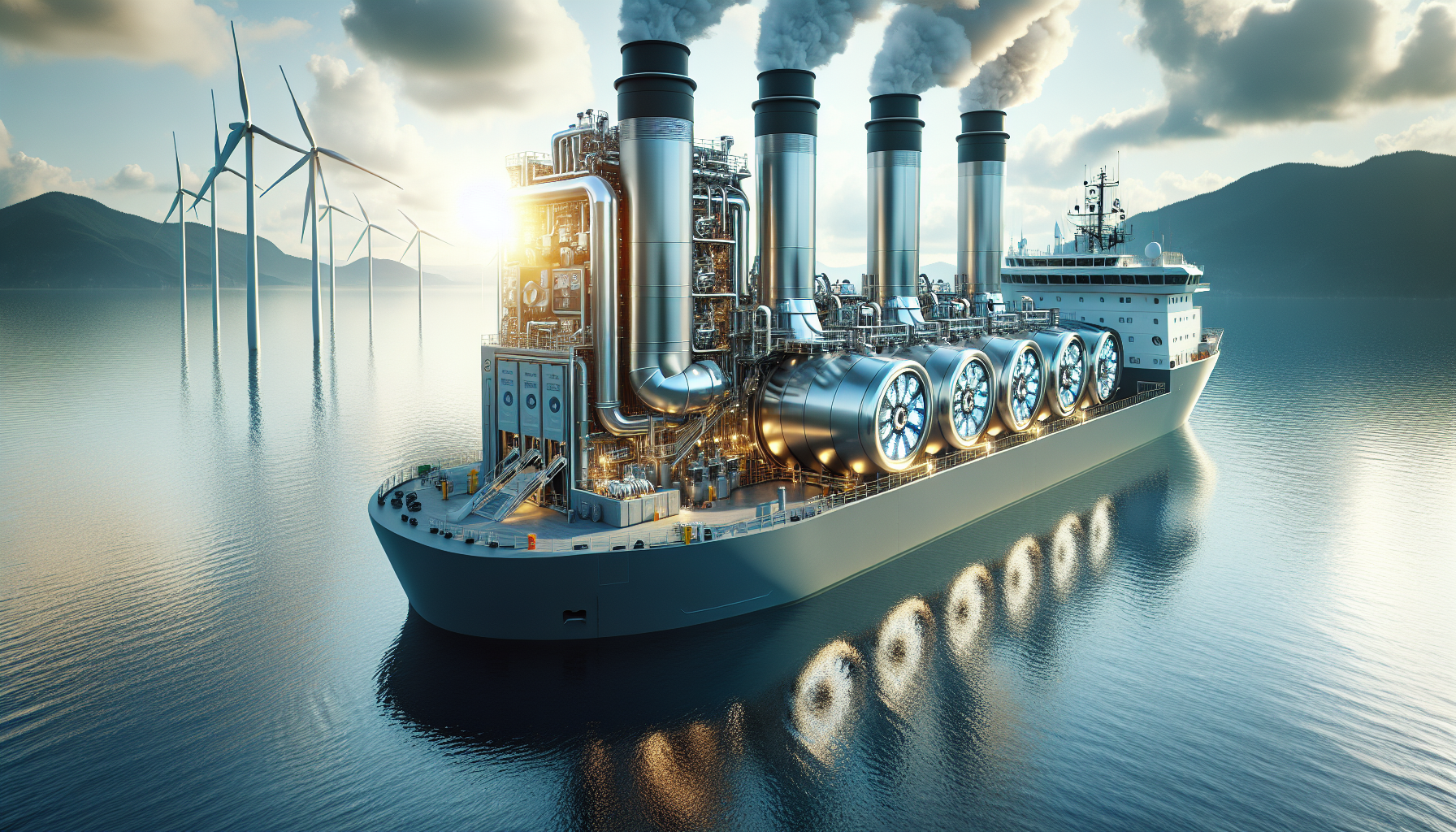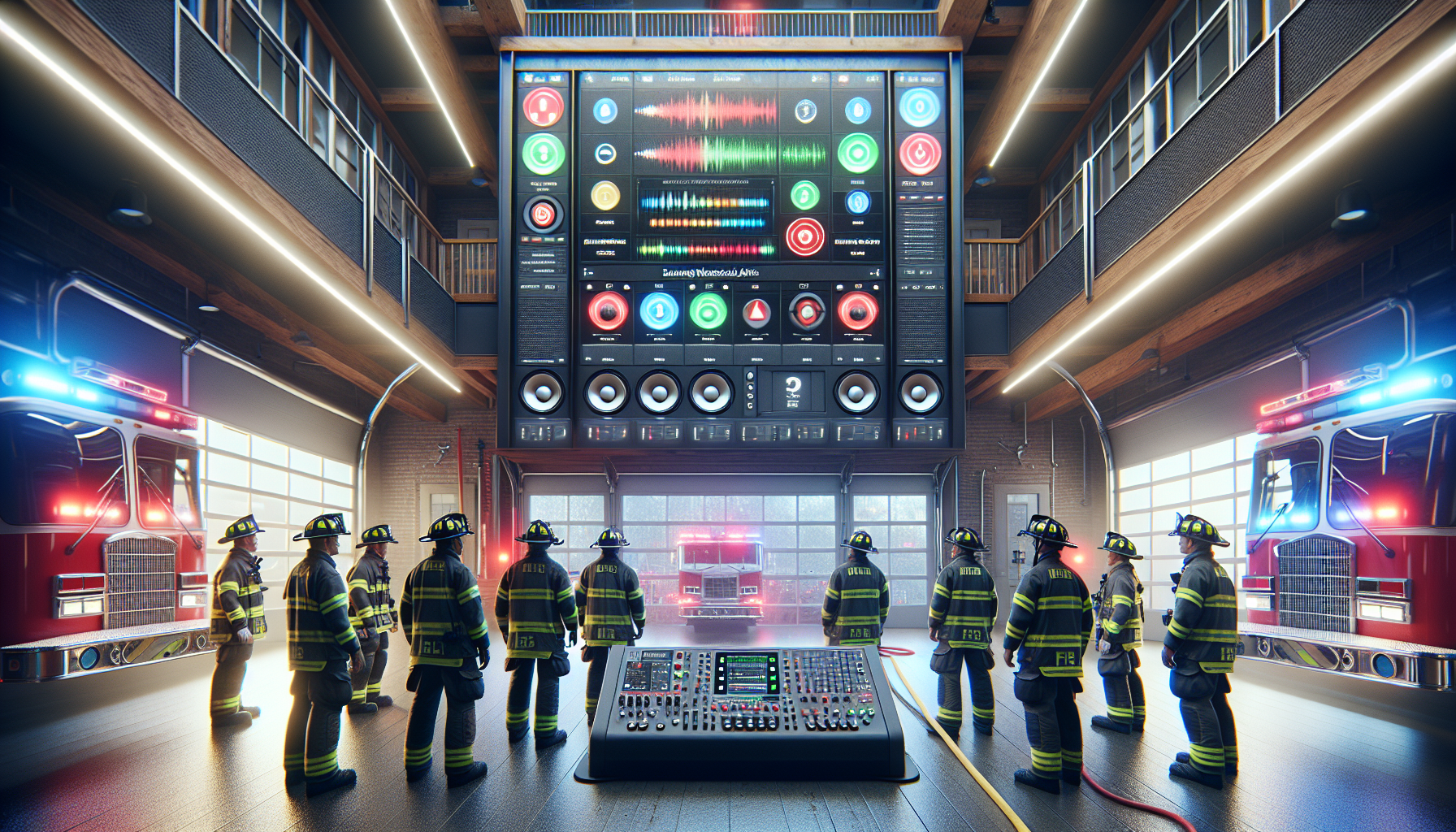In the vast expanse of the world’s oceans, where the horizon stretches endlessly and the air is filled with the salty tang of sea spray, a silent revolution is underway. This revolution, however, is not taking place on the sunlit decks where sailors chart their courses, nor in the bustling ports where goods are exchanged. Instead, it unfolds in the heart of ships, within the confines of their engine rooms, where innovative advancements in maritime boiler technology are quietly but powerfully setting the stage for a greener future. ⚓️
The maritime industry, a cornerstone of global trade and commerce, has long been both a marvel of human ingenuity and a significant contributor to environmental challenges. Traditional marine boilers, essential for propulsion and power generation on ships, have historically been a source of pollution, emitting greenhouse gases and other pollutants. As the world increasingly turns its attention to sustainability, the call for greener maritime practices has grown louder. This is where cutting-edge maritime boiler innovations come into play, offering solutions that promise to transform not only how ships operate but also how they impact our planet.
In this article, we delve deep into the world of maritime boiler innovations, exploring how these technologies are driving the industry toward a more sustainable future. From the integration of alternative fuels such as LNG and hydrogen, which significantly reduce emissions, to the development of hybrid systems that harness renewable energy sources, the possibilities are both exciting and promising. We will examine how these advancements not only improve fuel efficiency but also enhance the overall operational efficiency of ships, leading to cost savings and a smaller carbon footprint.
Moreover, we will shed light on the role of digitalization and smart technology in optimizing boiler performance. Imagine a ship’s boiler system that can self-diagnose issues, predict maintenance needs, and adjust operations in real time to maximize efficiency. This is not science fiction; it’s the future that maritime engineers and innovators are building today. Through the lens of case studies and expert insights, we will showcase how these intelligent systems are revolutionizing the maritime industry.
Finally, the article will discuss the broader implications of these innovations on global shipping regulations and the competitive landscape of the maritime industry. As international bodies tighten emissions standards and eco-conscious consumers demand greener shipping options, companies that embrace these new technologies are not just future-proofing their operations but also gaining a competitive edge. This shift toward sustainability is more than just an environmental imperative; it’s a strategic business decision that could redefine industry leadership in the coming decades.
As we embark on this exploration of cutting-edge maritime boiler innovations, we invite you to imagine a future where the seas remain as majestic and vital as they have always been, but where our interaction with them leaves a lighter footprint. The journey toward a greener maritime industry is underway, and it’s a voyage that promises to chart new courses for both the ships of today and the generations of tomorrow. 🌊
The Evolution of Maritime Boilers
Maritime boilers have been pivotal in powering ships since the advent of steam propulsion in the early 19th century. These boilers have undergone significant transformations, evolving from rudimentary designs to advanced systems that underpin modern marine engineering. The evolution of maritime boilers can be divided into several phases, each marked by technological advancements and a deeper understanding of thermodynamics and materials science.
The initial phase saw the use of simple fire-tube boilers, where heat from burning coal passed through tubes to heat water in a tank, creating steam. These early designs, while groundbreaking at the time, had limitations in terms of efficiency and safety. The need for larger ships and longer voyages necessitated the development of more advanced boilers that could produce more steam and withstand higher pressures.
As technology progressed, water-tube boilers emerged as a solution to these challenges. Water-tube boilers feature water-filled tubes that are heated externally, allowing for greater heat absorption and steam generation. This design not only improved efficiency but also enhanced safety, as the smaller volume of water minimized the risk of catastrophic explosions. Furthermore, the materials used in construction, such as steel alloys, were specifically chosen to withstand the high temperatures and pressures inherent in maritime operations.
Technological Advancements in Boiler Design
The advent of computer-aided design (CAD) and simulation software has revolutionized boiler engineering. Engineers can now model the performance of different designs, optimize efficiency, and predict maintenance needs with unprecedented accuracy. This technological leap has led to the development of boilers that are not only more efficient but also more reliable and easier to maintain.
Moreover, innovations in automation and control systems have further enhanced boiler performance. Modern maritime boilers are equipped with sensors and control units that monitor key parameters such as temperature, pressure, and fuel consumption in real-time. These systems can automatically adjust operations to maintain optimal performance, reducing the risk of human error and improving overall safety.
The use of alternative fuels is another area where significant advancements have been made. Boilers designed to utilize liquefied natural gas (LNG), biofuels, and even hydrogen are being developed and tested. These alternative fuels have lower carbon footprints compared to traditional marine fuels, making them an attractive option for shipping companies seeking to reduce their environmental impact.
Environmental Impact and Regulatory Changes
As the shipping industry grapples with the need to reduce its environmental impact, the role of boilers in achieving these goals has come under scrutiny. The International Maritime Organization (IMO) has implemented regulations aimed at reducing greenhouse gas emissions from ships, prompting a shift towards more sustainable boiler technologies.
The introduction of the IMO 2020 regulation, which limits the sulfur content in marine fuels, has been a significant driver of change. This regulation has led to the development of scrubbers and other technologies that reduce emissions from boiler exhausts. Additionally, the IMO’s strategy to halve greenhouse gas emissions by 2050 has spurred research into zero-emission propulsion technologies, including electric and hybrid systems that integrate with traditional boilers.
The following table compares traditional marine fuels with alternative options, highlighting their environmental impact and suitability for modern boilers:
| Fuel Type | Carbon Emissions | Sulfur Content | Boiler Compatibility |
|---|---|---|---|
| Heavy Fuel Oil (HFO) | High | High | Traditional Boilers |
| Liquefied Natural Gas (LNG) | Low | Low | Advanced Boilers |
| Biofuels | Moderate | Low | Advanced Boilers |
| Hydrogen | Zero | Zero | Emerging Technologies |
As you can see from the table, alternative fuels present a viable path towards reducing the environmental footprint of maritime operations. For more insights on the environmental challenges faced by the shipping industry, watch the informative video below:
Maritime Emissions and the Future of Green Shipping – Channel: GreenTech Marine
Challenges and Opportunities
The transition to greener maritime boilers is not without its challenges. One significant barrier is the high cost associated with retrofitting existing ships to accommodate new boiler technologies. Additionally, the availability and infrastructure for alternative fuels like LNG and hydrogen are still limited in many parts of the world. This presents logistical challenges for shipping companies looking to make the switch.
Despite these challenges, the opportunities presented by innovative boiler technologies are substantial. The potential for cost savings through improved fuel efficiency and reduced emissions penalties is significant. Moreover, companies that adopt sustainable practices are likely to benefit from enhanced reputations and customer loyalty.
The ongoing research and development in this field are promising, with numerous pilot projects and collaborations between maritime companies, governments, and research institutions. These initiatives aim to accelerate the adoption of cutting-edge boiler technologies and address the challenges of scaling up production and distribution.
The Future of Maritime Boilers
Looking ahead, the future of maritime boilers is likely to be characterized by further integration of digital technologies and renewable energy sources. The use of artificial intelligence and machine learning to optimize boiler operations and predictive maintenance is set to become more prevalent. These technologies can significantly enhance the efficiency and reliability of boilers, reducing downtime and maintenance costs.
Furthermore, as renewable energy technologies such as solar and wind become more viable for marine applications, the integration of these energy sources with traditional boiler systems could offer a hybrid solution. This would enable ships to harness clean energy while maintaining the reliability and performance of conventional boilers.
The adoption of modular boiler designs is another trend to watch. These designs offer greater flexibility and scalability, allowing ships to adjust their power generation capabilities based on operational needs. This adaptability is particularly beneficial for vessels operating in diverse environments and under varying load conditions.
Conclusion: Navigating the Seas of Change
The maritime industry stands at a crossroads, with the need to balance economic viability with environmental responsibility. Cutting-edge boiler innovations offer a pathway to achieving this balance, providing cleaner, more efficient propulsion systems for the ships of the future. As the industry embraces these changes, it is poised to play a leading role in the global effort to combat climate change and ensure sustainable development.
- Embrace innovative technologies for a greener future.
- Stay informed about regulatory changes and industry trends.
- Consider the long-term benefits of investing in sustainable boiler technologies.
For a deeper dive into the advancements in maritime technology, don’t miss out on the video below:
Innovations in Maritime Engineering – Channel: OceanTech Solutions

Conclusion
Conclusion: Revolutionizing the Seas: Cutting-Edge Maritime Boiler Innovations for a Greener Future
As we navigate through the vast expanse of maritime innovations, the significance of cutting-edge boiler technologies cannot be overstated. These advancements hold the potential to redefine the way we perceive maritime operations, pushing us towards a more sustainable and eco-friendly future. Let us recapitulate the crucial points discussed throughout this exploration and understand why this topic matters so profoundly to our environmental and industrial landscapes.
At the heart of our discussion was the pressing need for environmental sustainability in the maritime industry. Traditional boilers, with their reliance on fossil fuels, have long been a major contributor to maritime pollution, emitting harmful gases that significantly impact our atmosphere and oceans. This underscores the urgency for a paradigm shift towards greener technologies that can mitigate these environmental concerns. The introduction of innovative boiler systems, such as those powered by renewable energy sources like LNG (liquefied natural gas) and hydrogen, marks a pivotal step in reducing carbon footprints and promoting cleaner seas.
Moreover, these cutting-edge boiler technologies are not just about reducing emissions; they are about enhancing efficiency and operational effectiveness. The incorporation of advanced automation and smart technologies into boiler systems allows for optimized fuel consumption, real-time monitoring, and predictive maintenance. These innovations not only minimize environmental impact but also contribute to cost savings and operational reliability, thereby offering a compelling value proposition for stakeholders in the maritime sector.
An important aspect we explored was the role of regulatory frameworks and international collaborations in fostering these technological advancements. Organizations such as the International Maritime Organization (IMO) have been instrumental in setting standards and guidelines that encourage the adoption of greener technologies. These collaborative efforts are essential in creating a cohesive approach to maritime sustainability, ensuring that industry players are aligned in their goals and practices.
The transition to advanced boiler systems is also being supported by significant investments in research and development. Maritime companies are partnering with technology firms and research institutions to innovate and bring forth solutions that are not only environmentally sound but also economically viable. These partnerships are crucial in accelerating the development and deployment of new technologies, ensuring that the maritime industry keeps pace with the evolving demands of global sustainability.
In emphasizing the importance of this topic, we must acknowledge that the health of our oceans is intrinsically linked to the health of our planet. Maritime activities account for a substantial portion of global trade and transportation, and their impact on marine ecosystems is profound. By adopting cutting-edge boiler innovations, we are taking a proactive stance in preserving our oceans for future generations. This commitment to sustainability is not merely a regulatory requirement; it is a moral obligation to protect the natural resources that sustain life on Earth 🌍.
As we conclude this discussion, it is essential to recognize that the journey towards a greener maritime future is a collective endeavor. We encourage stakeholders across the maritime industry, from engineers and shipowners to policymakers and environmentalists, to actively participate in this transformative movement. By sharing insights, fostering collaborations, and implementing innovative solutions, we can accelerate the pace of change and achieve a more sustainable maritime sector.
We invite you, dear reader, to join us in this mission. Whether you are a maritime professional, an environmental advocate, or simply someone passionate about sustainability, your voice and actions matter. Share this article with your network to raise awareness about the importance of green maritime technologies. Engage in discussions and provide feedback on how we can collectively drive progress in this field. Most importantly, apply the knowledge gained here in your respective spheres of influence, championing the cause of a greener future for our seas.
In conclusion, the innovations in maritime boiler technology represent a beacon of hope for our oceans and our planet. By embracing these advancements, we are not only enhancing the efficiency and sustainability of maritime operations but also contributing to a healthier and more resilient global ecosystem. Let us forge ahead with determination and unity, inspired by the promise of a cleaner and more sustainable world for generations to come.
For further reading and resources, you may explore the following active links:
– International Maritime Organization (IMO): www.imo.org
– Renewable Energy in Maritime Transport: www.irena.org
Let us sail towards a brighter, greener horizon! 🌊🚢
Toni Santos is a visual historian and creative artisan whose work channels the bold spirit of the steam-powered era—a time when imagination, mechanics, and ambition converged to reshape the modern world. Through richly detailed visual narratives and handcrafted design, Toni celebrates the legacy of steam innovation as both an artistic and technological revolution.
Driven by a passion for mechanical aesthetics, forgotten inventions, and industrial-age ingenuity, Toni reimagines the world of steam through illustrations, tactile artifacts, and storytelling that capture the poetry of pressure, motion, and invention. From piston-driven engines to brass-detailed diagrams, each piece reveals how steam wasn’t just power—it was promise.
With a background in visual design and historical research, Toni brings a craftsman’s eye and a dreamer’s heart to the stories of tinkerers, inventors, and visionaries who shaped the 19th century. His work doesn’t merely document machines—it honors the culture, courage, and creativity that drove a world to reimagine itself through gears, valves, and vapor.
As the creative voice behind Vizovex, Toni shares curated articles, reconstructed blueprints, and visual interpretations that bring this industrial past to life. His collections serve as a tribute to:
The elegance of steam-era design and innovation
The human stories behind great mechanical feats
The aesthetic beauty found in function and form
The echo of invention in today’s creative world
Whether you’re a history lover, a fan of steampunk, or an admirer of antique technology, Toni welcomes you into a world where art and machinery fuse, one cog, one drawing, one rediscovered marvel at a time.





